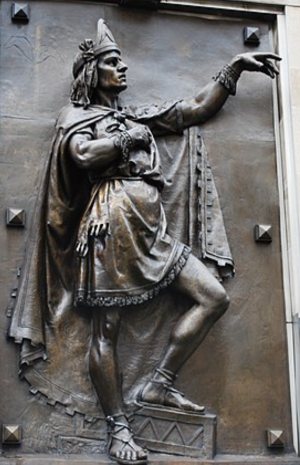TheGhostEnthusiast
King
NEZAHUALCOYOTL

NEZAHUALCOYOTL, TLATOANI PERSONA
Nezahualcoyotl’s conquests led to the rise of the Aztec Empire, and the rise of Tenochtitlan and Texcoco as powerful political forces. His conquests set the stage for the systems of tribute that would fuel the Triple Alliance, and he used that wealth to undergo great construction projects. His dams, levees, and aqueducts turned the settlements of Lake Texcoco into the hydrological engineering marvels that they would go down in history as.Unique Ability
Aztec Empire:
- Conquering a City State or dispersing an Independent Power grants a burst of
 Food and
Food and  Gold in the Capital.
Gold in the Capital. - +100%
 Production towards Buildings on Lakes.
Production towards Buildings on Lakes.- Buildings on Lakes gain
 Production and
Production and  Gold for every City State you occupy or are Suzerain of.
Gold for every City State you occupy or are Suzerain of. Attributes
- Militaristic
- Economic
Fasting Coyote: Likes Civilizations that do not Conquer or become Suzerain of more City States than he has total. Dislikes Civilizations that do.
Starting Bias
- Lakes
NEZAHUALCOYOTL, TLAMATINI PERSONA
Nezahualcoyotl’s conquests led to the rise of the Aztec Empire, and the rise of Tenochtitlan and Texcoco as thriving metropolises. He embraced his Mexica heritage to help him enforce laws and rebuild Tenochtitlan, and he established a group of intellectuals to enrich cultural learning in the empire, his own works of poetry including among theirs. Texoco became home to a large library containing his works and the works his policies helped nurture, and he himself is placed as one of the greatest thinkers of this period of enlightenment.Unique Ability
Athens of the West:
- Specialists gain additional
 Science and
Science and  Culture for each Great Work slotted on their tile, doubled in the Capital.
Culture for each Great Work slotted on their tile, doubled in the Capital.-
 Happiness and
Happiness and  Science buildings gain Great Work slots in the Capital.
Science buildings gain Great Work slots in the Capital.- Settlements gain
 Happiness for each Great Work slotted in the Capital.
Happiness for each Great Work slotted in the Capital.Attributes
- Cultural
- Scientific
Texcoco's Golden Age: Likes Civilizations that have frequent Celebrations. Dislikes Civilizations that have had few Celebrations.
Starting Bias
- Lakes


 )
)
 Influence towards the Befriend Independent Power and Integrate Independent Power actions.
Influence towards the Befriend Independent Power and Integrate Independent Power actions.  Settlement Limit.
Settlement Limit.